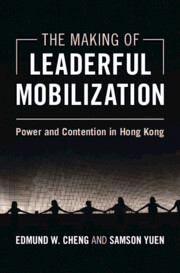Book contents
- Reviews
- The Making of Leaderful Mobilization
- Cambridge Studies in Contentious Politics
- The Making of Leaderful Mobilization
- Copyright page
- Dedication
- Contents
- Figures
- Tables
- Preface
- Acknowledgements
- Notes on Transliteration
- Abbreviations
- 1 Introduction
- Part I Context
- Part II Episodes
- Part III Mechanisms
- 6 Sectoral Networks
- 7 Loss of Innocence
- 8 Peer Collaboration
- 9 Money Matters
- 10 Radicalization with Solidarity
- 11 Conclusion
- Appendices
- References
- Index
6 - Sectoral Networks
from Part III - Mechanisms
Published online by Cambridge University Press: 30 January 2025
- Reviews
- The Making of Leaderful Mobilization
- Cambridge Studies in Contentious Politics
- The Making of Leaderful Mobilization
- Copyright page
- Dedication
- Contents
- Figures
- Tables
- Preface
- Acknowledgements
- Notes on Transliteration
- Abbreviations
- 1 Introduction
- Part I Context
- Part II Episodes
- Part III Mechanisms
- 6 Sectoral Networks
- 7 Loss of Innocence
- 8 Peer Collaboration
- 9 Money Matters
- 10 Radicalization with Solidarity
- 11 Conclusion
- Appendices
- References
- Index
Summary
Chapter 6 looks at how sectoral networks propelled the Anti-Extradition Movement. By focusing on religious groups, legal professionals, and medical practitioners, we demonstrate how social identities informed protesters what roles to take up during a spontaneous movement, and how these sectoral networks provided expertise and resources to facilitate the movement’s organizing efforts.
Keywords
Information
- Type
- Chapter
- Information
- The Making of Leaderful MobilizationPower and Contention in Hong Kong, pp. 137 - 156Publisher: Cambridge University PressPrint publication year: 2025
